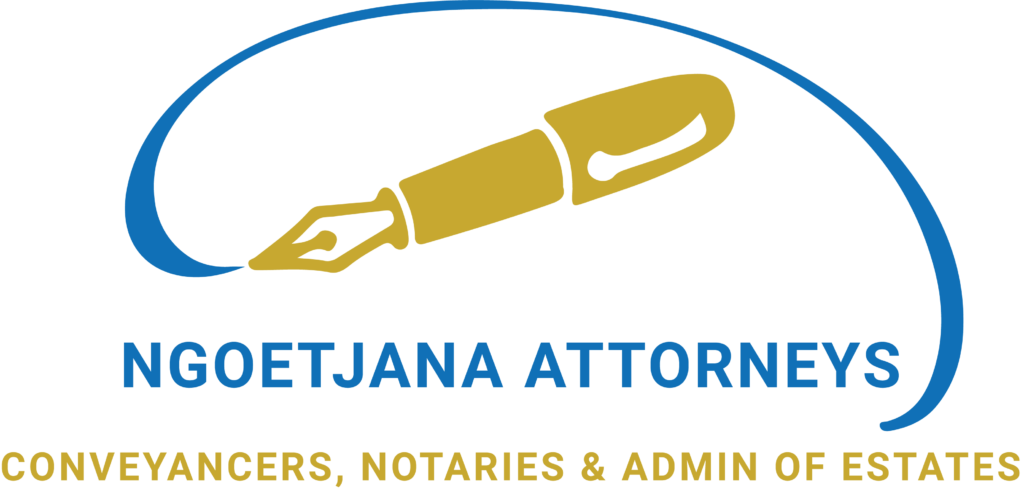Administration of Deceased Estates Attorneys in South Africa
The passing of a loved one can be a very traumatic and emotional time that might come with stressful legal and financial worries. Winding up an estate of your deceased loved one in South Africa can be a long and challenging process.
However, the assistance of a legally trained and professional lawyer in South Africa can ease the burden. We are therefore here to assist in this regard.
Ngoetjana Attorneys deals with the administration of all deceased estates in South Africa, which also covers the administration of insolvent deceased estate, intestate and testate deceased estate, in terms of the Insolvency Act, Administration of Estates Act and Intestate Succession Act.
A deceased estate in South Africa is established when a person dies, leaving property or a will. A person may make a Will directing how his assets shall devolve after his death, in which case the Law of Testate Succession, the Wills Act 7 of 1953 will apply.
In South Africa, when a person dies without leaving a valid Will, the Law of Intestate Succession Act 81 of 1987 will apply. In such an event, the deceased estate will be divided among the surviving spouse, children, parents, or siblings according to a set formula.
Ngoetjana Attorneys encourages individuals to create a valid Will to determine how their estate should devolve when they pass. The advantage of leaving a valid Will in South Africa is that the possibilities of a lengthy and challenging process of winding up an estate will be minimal and/or eliminated.
When there is valid Will the person appointed as executor will be someone chosen by the deceased and distribution will be to individuals chosen and approved by the deceased.
Ngoetjana Attorneys will take care of all the details of winding up the estate of your loved one, and prevent any unnecessary delays so to find closure as soon as possible to you and your family.
We therefore assist in Appointment of Executor, Reporting to the Master of the High Court, Notice to Creditors and Preparation of the Liquidation and Distribution Account. We also assist in creating Valid Wills and Trusts.
Frequently Asked Questions
1. What is a deceased estate?
A deceased estate is the property and assets left behind by a person after they pass away. Administering a deceased estate involves identifying and valuing the assets, paying off any debts and taxes, and distributing the remaining assets to the beneficiaries.
2. Do I need an attorney to administer a deceased estate?
While it is possible to administer a deceased estate without an attorney in South Africa, the process can be complex and time-consuming. An experienced lawyer in South Africa can provide valuable guidance and support to ensure that the process proceeds smoothly and that your legal rights are protected.
3. What fees are involved in administering a deceased estate?
Administering a deceased estate in South Africa involves various fees, including attorney fees, executor fees, and fees for services such as valuations and appraisals. These fees can vary depending on the size and complexity of the estate.
4. What happens if there is no will?
If a person passes away without a valid will, their assets will be distributed according to the laws of intestacy. This can result in a complex and time-consuming process, and it is recommended that you seek the assistance of an experienced attorney in South Africa to help navigate the process.
5. What is the role of an executor in administering a deceased estate?
The executor is the person appointed in the will to administer the estate. Their duties include gathering and valuing the assets, paying off any debts and taxes, and distributing the remaining assets to the beneficiaries. The executor is responsible for ensuring that the process is carried out according to the law and the wishes of the deceased.
6. Can I contest a will?
Yes, it is possible to contest a will if you believe that it was not made in accordance with the law or the wishes of the deceased. This can be a complex and difficult process, and it is recommended that you seek the assistance of an experienced lawyer in South Africa.
7. What happens if there is a dispute among the beneficiaries?
Disputes among beneficiaries can arise for various reasons, such as disagreements over the distribution of assets or allegations of wrongdoing by the executor. In such cases, it is important to seek the assistance of an experienced lawyer in South Africa who can help you navigate the process and achieve a fair resolution.
8. What is the difference between a living will and a last will and testament?
A living will is a legal document that outlines your wishes for medical treatment in the event that you become incapacitated and unable to make decisions for yourself. A last will and testament, on the other hand, is a legal document that outlines how your assets should be distributed after your death.
9. How can I ensure that my estate is administered according to my wishes?
To ensure that your estate is administered according to your wishes, it is important to work with an experienced attorney in South Africa to draft a comprehensive estate plan that includes a will, trusts, and other legal documents. This can help to ensure that your assets are distributed according to your wishes and that your loved ones are taken care of after your passing.
10. What locations do we service in South Africa?
We service the entire South Africa area. Be it you’re in Pretoria, Kempton Park, Centurion or anywhere in South Africa.

